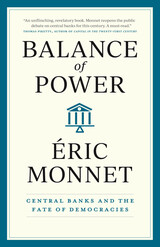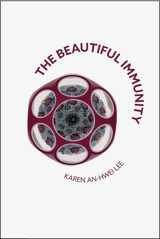3 books by Warren, Catherine
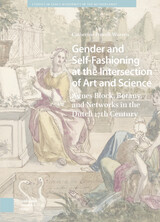
Gender and Self-Fashioning at the Intersection of Art and Science
Agnes Block, Botany, and Networks in the Dutch 17th Century
Catherine Powell-Warren
Amsterdam University Press, 2024
At once collector, botanist, reader, artist, and patron, Agnes Block is best described as a cultural producer. A member of an influential network in her lifetime, today she remains a largely obscure figure. The socioeconomic and political barriers faced by early modern women, together with a male-dominated tradition in art history, have meant that too few stories of women’s roles in the creation, production, and consumption of art have reached us. This book seeks to write Block and her contributions into the art and cultural history of the seventeenth-century Netherlands, highlighting the need for and advantages of a multifaceted approach to research on early modern women. Examining Block’s achievements, relationships, and objects reveals a woman who was independent, knowledgeable, self-aware, and not above self-promotion. Though her gender brought few opportunities and many barriers, Agnes Block succeeded in fashioning herself as Flora Batava, a liefhebber at the intersection of art and science.
[more]
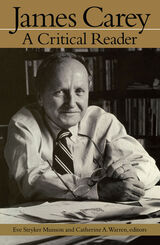
James Carey
A Critical Reader
Eve Stryker Munson
University of Minnesota Press, 1997
An essential guide to the thought of a central figure in media studies .
James Carey-scholar, media critic, and teacher of journalists-almost single-handedly established the importance of defining a cultural perspective when analyzing communications. Interspersing Carey’s major essays with articles exploring his central themes and their importance, this collection provides a critical introduction to the work of this significant figure.
Long before the “interpretive turn” became the fashion in the humanities and sociology, Carey was busily studying and combining the ideas of an impressive array of philosophers, sociologists, historians, and anthropologists, including John Dewey, Clifford Geertz, Raymond Williams, Thomas Kuhn, Max Weber, C. Wright Mills, Richard Rorty, Jürgen Habermas, Harold Innis, and Lewis Mumford. In James Carey: A Critical Reader, seven scholars who have been influenced by him consider his work and how it has affected the development of media studies. Carey has demonstrated that mass communications serve a complex function in society, with one central question reflecting his concerns: How does one make democracy work in a vast country that spans a continent? In his view, symbols, language, and those who create them are reality-creating, rather than reality-reflecting. Carey has examined the roles the media and the academy have played in creating and maintaining a public sphere, as well as the ways technology helps or hinders that project. Carey’s themes range from the strains on democracy and drawbacks of technology to the critique of journalism and the politics of academe. Contributors: G. Stuart Adam, Carleton U, Canada; James Carey, Columbia U; Carolyn Marvin, U of Pennsylvania; John Pauly, St. Louis U; Jay Rosen, New York U; Michael Schudson, U of California, San Diego.[more]
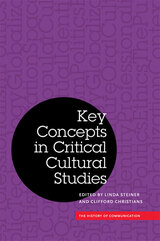
Key Concepts in Critical Cultural Studies
Edited by Linda Steiner and Clifford Christians
University of Illinois Press, 2010
This volume brings together sixteen essays on key and intersecting topics in critical cultural studies from major scholars in the field. Taking into account the vicissitudes of political, social, and cultural issues, the contributors engage deeply with the evolving understanding of critical concepts such as history, community, culture, identity, politics, ethics, globalization, and technology. The essays address the extent to which these concepts have been useful to scholars, policy makers, and citizens, as well as the ways they must be rethought and reconsidered if they are to continue to be viable. Each essay considers what is known and understood about these concepts. The essays give particular attention to how relevant ideas, themes, and terms were developed, elaborated, and deployed in the work of James W. Carey, the "founding father" of cultural studies in the United States. The contributors map how these important concepts, including Carey's own work with them, have evolved over time and how these concepts intersect. The result is a coherent volume that redefines the still-emerging field of critical cultural studies. Contributors are Stuart Allan, Jack Zeljko Bratich, Clifford Christians, Norman Denzin, Mark Fackler, Robert Fortner, Lawrence Grossberg, Joli Jensen, Steve Jones, John Nerone, Lana Rakow, Quentin J. Schultze, Linda Steiner, Angharad N. Valdivia, Catherine Warren, Frederick Wasser, and Barbie Zelizer.
[more]
READERS
Browse our collection.
PUBLISHERS
See BiblioVault's publisher services.
STUDENT SERVICES
Files for college accessibility offices.
UChicago Accessibility Resources
home | accessibility | search | about | contact us
BiblioVault ® 2001 - 2024
The University of Chicago Press




